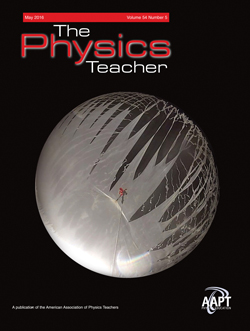Volume 54 Issue 5, May 2016
The Physics Teacher
This month's cover shows a weather balloon from below, just after it bursts. Where do the balloon's remnant tendrils (and the tether's tug, apparent just southwest of center) suggest as the location of the failure point of the balloon? To examine the complete photo sequence, see the article Integrating balloonSAT and atmospheric dynamic concepts into the secondary classroom by B. N. Fong, J. T. Kennon, E. Roberts.
Columns
Figuring Physics, iPhysics Labs, Little Jems,
Papers
Can you beat this? by Charles H. Holbrow DOI: 10.1119/1.4947149
Homemade Wooden Vernier Scales for Use by Blind Students by Mike Tomac, Cricket Bidleman, and Dan Brown. DOI: 10.1119/1.4947150
Weather Balloon Ascent Rate by Mark Denny. DOI: 10.1119/1.4947151
Confronting Twin Paradox Acceleration by Thomas W. Murphy Jr. DOI: 10.1119/1.4947152
Moving Phones Tick Slower: Creating an Android App to Demonstrate Time Dilation by Bret Underwood and Yunxiao Zhai. DOI: 10.1119/1.4947154
Linking Science Fiction and Physics Courses by Krista K. McBride. DOI: 10.1119/1.4947155
Measurement of Coriolis Acceleration with a Smartphone by Asif Shakur and Jakob Kraft. DOI: 10.1119/1.4947157
MAUVE: A New Strategy for Solving and Grading Physics Problems by Nicole Breanne Hillt. DOI: 10.1119/1.4947158
Impact of Guided Reflection with Peers on the Development of Effective Problem Solving Strategies and Physics Learning by Andrew J. Mason and Chandralekha Singh. DOI: 10.1119/1.4947159
CD, DVD, and Blu-Ray Disc Diffraction with a Laser Ray Box by Alan J. DeWeerd. DOI: 10.1119/1.4947160
Group Work Tests for Context-Rich Problems by Chris Meyer. DOI: 10.1119/1.4947161
And the Survey Says: Top bachelor's-producing departments by Susan White. DOI: 10.1119/1.4947162


